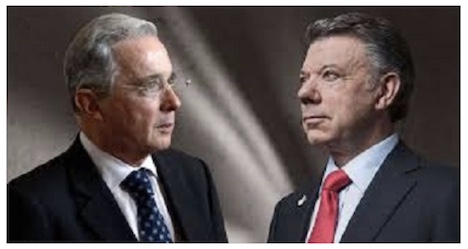The Colombian military assassinated 6,402 civilians
 Print This Print This
By Gustavo Vasallo | Pagina12 Argentina
Pagina12, trans. Arturo Rosales, Axis of Logic
Sunday, Feb 21, 2021
 |
| Alvaro Uribe (L), Juan Manuel Santos (R) |
It is clear from the work of the Special Jurisdiction for Peace (JEP) that the death toll is three times what was believed. Almost all deaths occurred during the presidency of Alvaro Uribe and when his successor as President, Juan Manuel Santos was Minister of Defense.
The Colombian Justice Mechanism investigating crimes committed in the conflict between the State and armed groups raised the number of civilians killed by the military to 6,402 and presented as combatants between 2002 and 2008. The so-called "false positives", which constitute one of the darkest chapters of the internal conflict that has dogged Colombia since the 1960s, involve some 1,500 military personnel. It is apparent from the work of the Special Jurisdiction for Peace (JEP) that the death toll is three times what was believed and that during the presidency of Alvaro Uribe, 78% of the total deaths were recorded.
Although the military high command always denied that it was a systematic practice, some officers and soldiers have already confessed to their involvement in the crimes. However, the peace court has not yet issued any convictions since starting operation ins 2018. "We hope that this exercise will identify the top perpetrators, i.e. those who designed the strategy and gave the order for military units to implement it systematically and atrociously," Luis Alfonso Castillo, spokesman for the National Movement of Victims of State Crimes stated.
Case 03 is characterized as "Deaths illegitimately presented as casualties in combat by state agents". As it began to search this area, the JEP received a report from the Attorney General's Office, which rated false positives at 2,248. However, this special justice mechanism now recognizes that extrajudicial executions at triple that number.
"The JEP states that at least 6,402 people were killed and filed as combat casualties throughout the country between 2002 and 2008," the Court's Truth recognition and accountability Chamber investigating the case raised on Thursday. The big difference between the figures provided by the government and the findings of the JEP is still unsettling," Castillo said. "However, extrajudicial executions were part of a policy taught by Colombian military forces across the country," a MOVICE spokesman added.
False positives involve about 1,500 military personnel who tricked civilians so that they could murder them and in this way demonstrate a better performance to their superiors amid bloody combat with the guerrillas. In this way, they obtained permits, prizes and other benefits. The victims of this macabre machinery were initially inhabitants of rural areas in 29 of the country's 32 departments, although the phenomenon was subsequently replicated in urban areas, killing people on the street, informal workers, and even the disabled.
Among the more than 220 JEP proceedings in this case, were retired General Mario Montoya Uribe, former Army Commander and retired General Paulino Coronado, as well as 51 soldiers, 38 NCOs, 32 junior officers, 10 officers with the rank of Major and 7 with the rank of colonel. Thanks to these proceedings, the peace court was able to recover the bodies of 71 people who were presented as combat casualties by state agents in the department of Antioquia.
On February 17, 2020, the JEP handed over to his relatives the body of Edison Lezcano Hurtado, a young farmer and 23-year-old father, the first to be identified from the remains exhumed at Las Mercedes Cemetery in Dabeiba, Antioquia. In addition, on 10 November, the remains of four other victims of the armed conflict, including two minors, were handed over by the JEP to their relatives.
Following the new number of false positives provided by Colombian justice, the imputation of charges and responsibilities will be initiated at mid-command level, that is, by those who would have carried out these crimes. They will then move on to the senior military commanders, who would have ordered the extrajudicial executions. Alejandro Restrepo, coordinator of the research area of the Peace and Reconciliation Foundation, hopes that the JEP "can move forward in clarifying judicial responsibility" even though the peace court "has a very difficult battle to wage against the sectors that are now in government who have waged a direct war against justice processes."
Translated from Spanish original by Arturo Rosales – Axis of Logic
Original URL
|
 Print This Print This

|

